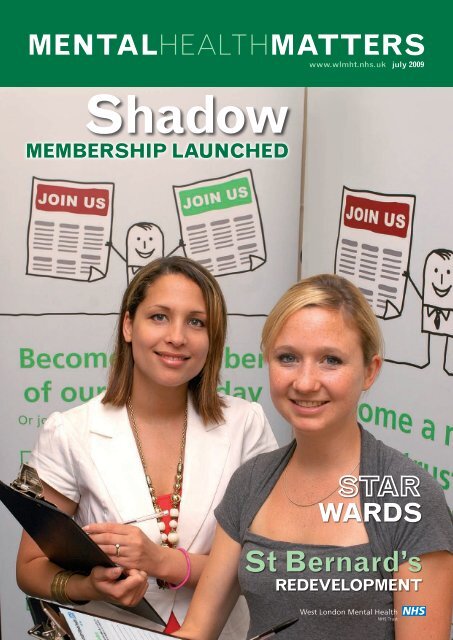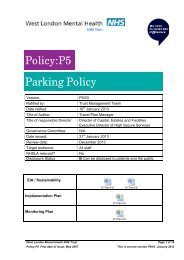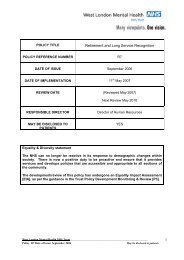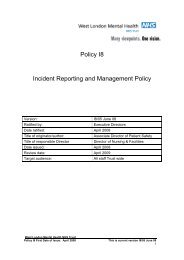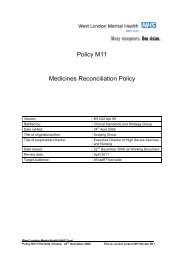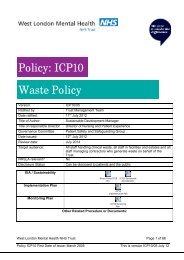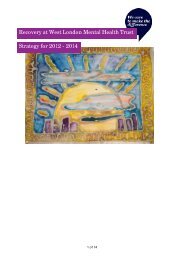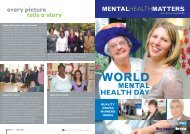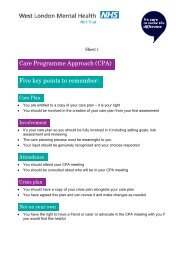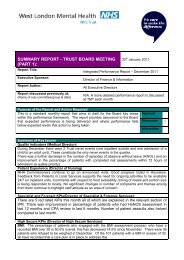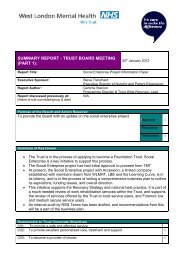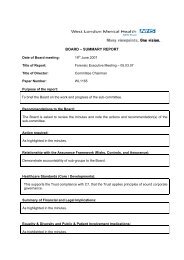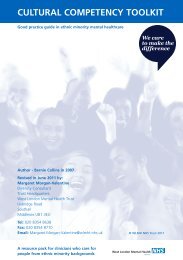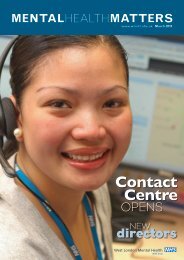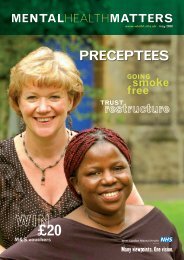St bernard's - West London Mental Health NHS Trust
St bernard's - West London Mental Health NHS Trust
St bernard's - West London Mental Health NHS Trust
You also want an ePaper? Increase the reach of your titles
YUMPU automatically turns print PDFs into web optimized ePapers that Google loves.
MENTALHEALTHMATTERS<br />
www.wlmht.nhs.uk july 2009<br />
Shadow<br />
membership launched<br />
WARDS<br />
<strong>St</strong> Bernard’s<br />
redevelopment<br />
MENTALHEALTHMATTERS 1
Simon Crawford, chief<br />
executive has left the trust<br />
to take up a position at <strong>NHS</strong><br />
<strong>London</strong> working on the<br />
acute healthcare provider<br />
programme for <strong>London</strong>.<br />
Chairman Nigel McCorkell says,<br />
“I would like to thank Simon for<br />
his enormous contribution to the<br />
trust. I am sorry that I have only<br />
had the opportunity to work with<br />
him for six months but I know that<br />
during his time as chief executive<br />
he has led on a number of major<br />
service developments including<br />
the Hammersmith & Fulham<br />
<strong>Mental</strong> <strong>Health</strong> Unit, the DSPD at<br />
Broadmoor Hospital, The Orchard<br />
and The Wells Unit at Ealing. He<br />
simonsays<br />
has overseen the establishment of<br />
National Service Framework teams<br />
in each of our boroughs including<br />
crisis resolution teams, home<br />
treatment and early intervention<br />
services – to name but a few.<br />
“Simon has had a huge impact<br />
in improving communications<br />
externally and within the<br />
organisation. He has strengthened<br />
and supported communications<br />
internally with staff through staff<br />
forums, staff publications and<br />
the launch of the Exchange. The<br />
intranet development has also<br />
resulted in the introduction of<br />
an electronic incident reporting<br />
system, improvements to budget<br />
management at the trust and<br />
HR processes. Simon has given<br />
recognition to individual members<br />
of staff through initiatives such<br />
as the Quality Awards and the<br />
Employee of the Month scheme.<br />
During the past year he has<br />
overseen a re-structure of the trust<br />
into five service delivery units which<br />
has supported improved patient<br />
pathways and better partnership<br />
working with primary care and<br />
commissioners of services.”<br />
Human rights inquiry<br />
The first major study of human rights in Britain<br />
has found that services which put human rights at<br />
their heart deliver successful results. The Equality<br />
and Human Rights Commission’s Human Rights<br />
Inquiry interviewed a wide range of people,<br />
including those working in mental health services.<br />
Their report quotes Dr Kevin Murray, clinical<br />
director of Broadmoor Hospital, saying that the<br />
hospital generally finds the Human Rights Act very<br />
Simon says, “I have worked<br />
in mental health since 1990<br />
and have been with this trust<br />
since 1997 when I came to<br />
work at Broadmoor on a six<br />
month secondment. I have been<br />
considering my longer term career<br />
aspirations in recent months<br />
and the opportunity I have been<br />
offered to work in the acute health<br />
sector feels like a good move for<br />
me at this stage in my career.<br />
The trust is now at a pivotal<br />
moment before embarking on its<br />
ambition to become a Foundation<br />
<strong>Trust</strong> equivalent (FTe) with an<br />
experienced chairman in post for<br />
six months. I have not taken the<br />
decision to move on lightly but<br />
believe now is the right time for<br />
the trust and myself. I wish the<br />
trust, its staff and patients well for<br />
the future and I look forward to it<br />
achieving FTe and the Broadmoor<br />
redevelopment being approved.”<br />
There will be an interview<br />
with new chief executive<br />
Peter Cubbon in the next<br />
edition of MHM.<br />
helpful: “We find it a useful way of saying: we’re a<br />
hospital, we’re here to treat patients. Our results<br />
are extraordinarily good in terms of what people<br />
do before they come to Broadmoor and what<br />
they do after they leave.” A survey commissioned<br />
to support the inquiry found that 84% of people<br />
wanted human rights enshrined in law and 81%<br />
saw them as important in creating a fairer society.<br />
mentalhealthmattersJULY2009<br />
www.wlmht.nhs.uk<br />
This has been done to enhance nursing governance<br />
across the trust, consequently improving the patient<br />
experience and driving up the quality of care. Four<br />
of a total five heads of nursing have now been<br />
appointed with responsibility for overall standards of<br />
nursing practice within their service delivery unit.<br />
Sandra Bailey<br />
Hammersmith<br />
& Fulham SDU<br />
Jenn Fellows<br />
Hounslow SDU<br />
Welcome to the JULY issue<br />
of <strong>Mental</strong> <strong>Health</strong> Matters<br />
The cover of the magazine<br />
promotes our ambition to<br />
become a Foundation<br />
<strong>Trust</strong> equivalent. At our<br />
recent annual general meeting<br />
we launched our shadow<br />
membership and you can read<br />
more about this on page four.<br />
<strong>St</strong>aff on the <strong>St</strong> Bernard’s site have attended roadshows<br />
to find out about the plans to redevelop the site, for the<br />
future benefits of patients and staff. The communications<br />
team is working closely with the development team and<br />
Heads of Nursing<br />
Jimmy Noak<br />
high secure<br />
services SDU<br />
Diane Wiles<br />
Ealing SDU<br />
will ensure that you are kept up to date with news on how<br />
the development progresses.<br />
Below you can read about our new heads of nursing at<br />
the trust introduced to enhance nursing governance<br />
at the trust. This is closely followed on page seven by<br />
an interview with one of the trust’s deputy directors of<br />
nursing, Carol Scott..<br />
I hope you enjoy the magazine. Do keep in touch with<br />
news from your area of the trust. You can email me at<br />
tara.ferguson-jones@wlmht.nhs.uk or call me on<br />
020 8354 8737<br />
With the introduction of five service delivery units (SDUs)<br />
heads of nursing are being recruited for each SDU.<br />
Sandra Bailey has been lead nurse for Ealing CAMHS<br />
for the past eight years. She says, “I am delighted to<br />
be embarking on a new and exciting venture in taking<br />
up the post of head of nursing in Hammersmith &<br />
Fulham. The main aspect of the post is to ensure that<br />
all service users and their families/carers who come<br />
into contact with the service receive the quality of<br />
care they deserve and making it a positive experience.<br />
Another key role will be to provide effective leadership<br />
for all nurses in the SDU and making sure that their<br />
contribution is valued. I am really looking forward to<br />
working with my colleagues in H&F and am delighted<br />
to be given the opportunity to make a difference<br />
to the care experience of patients and the working<br />
experience of staff.<br />
Diane Wiles is head of nursing for Ealing SDU. She<br />
says, “I will be working with colleagues to promote<br />
and evidence high standards of nursing care across the<br />
Ealing SDU. I will also be working alongside the other<br />
heads of nursing so that best practice is shared and<br />
that the highest standards of nursing care are achieved<br />
and maintained across WLMHT. It is an exciting time<br />
as nurses have been given the opportunity to really<br />
influence the development of services and has better<br />
defined nursing career options.”<br />
2 MENTALHEALTHMATTERS MENTALHEALTHMATTERS 3
AGM launches<br />
FTe membership<br />
Hammersmith and Fulham hosted this year’s AGM on 2 July<br />
and opened the doors to around 150 people, including staff,<br />
service users and local people. The event highlighted best<br />
practice programmes initiated over the last 12 months and<br />
was an appropriate forum to launch the Foundation <strong>Trust</strong><br />
equivalent (FTe) membership as the trust looks ahead.<br />
A number of people including<br />
carers, service users and our<br />
community partners signed up<br />
to become members. Once the<br />
trust receives authorisation<br />
to become an FTe, their<br />
membership will automatically<br />
rollover to become fully<br />
fledged members.<br />
“I am excited that the trust<br />
is taking these first steps to<br />
becoming an FTe membership<br />
organisation. I hope that<br />
our members will receive<br />
satisfaction from having<br />
greater influence on the future<br />
development of trust services<br />
and a greater ownership of<br />
local strategies,” said deputy<br />
chief executive Ian Kent.<br />
<strong>Trust</strong> staff will be automatically<br />
extended membership. Ian Kent<br />
adds, “Our staff already invest<br />
much of their time and energy<br />
in the trust. I am optimistic<br />
that, as members and future<br />
governors, they too will enjoy<br />
shaping the trust to the benefit<br />
of service users and carers.<br />
<strong>St</strong>aff will have the option of<br />
opting out of membership,<br />
should they wish.”<br />
Over the coming weeks, staff<br />
will receive further information<br />
about FTe membership, their<br />
involvement and benefits for<br />
themselves and service users.<br />
Redeveloping<br />
<strong>St</strong> Bernard’s<br />
Over the last year or so, the trust has been<br />
exploring how the <strong>St</strong> Bernard’s site can be improved<br />
to provide more suitable accommodation for its<br />
patients, staff and visitors. A decision has been made<br />
to sell off parts of the site and use the income to<br />
develop more suitable long term facilities on the site.<br />
The first step is for the trust to produce a<br />
strategic outline business case (SOC). This should<br />
be complete by September 2009 and will look<br />
at different ways in which some of the current<br />
accommodation can be re-provided. This could mean<br />
both new buildings and using some of the existing<br />
buildings on site that are suitable to be adapted or<br />
refurbished.<br />
Once the SOC has been approved by the<br />
Department of <strong>Health</strong>, the trust will then have to<br />
undertake and gain approval for an outline business<br />
case (OBC) and then a full business case (FBC), as<br />
with the Broadmoor redevelopment.<br />
The project is being led by Ian Kent, deputy chief<br />
executive. “Many of our patients and staff are<br />
accommodated in old Victorian buildings such<br />
as the Tony Hillis Wing,” he says. “We recognise<br />
that buildings such as these do not offer the best<br />
environment for providing quality care. They are<br />
also expensive to maintain and repair.<br />
“Modern inpatient care and environments are key<br />
requirements for delivering our strategic objectives,<br />
clinical strategy and service development plans. We<br />
want to provide accommodation that is as safe,<br />
Pam Scott and Dr Nick Broughton, clinical director of west <strong>London</strong> forensic SDU<br />
modern and secure as it possibly can be. It’s an<br />
exciting project but one that will require a lot of<br />
hard work.”<br />
The project team will endeavour to ensure that<br />
patients, staff and visitors are kept up to date with<br />
progress via the Exchange, existing <strong>Trust</strong> publications,<br />
presentations and newsletters.<br />
Further information: Pam Scott 01344 754337 or<br />
Pamela.scott@wlmht.nhs.uk<br />
4 MENTALHEALTHMATTERS MENTALHEALTHMATTERS 5
You and your pension:<br />
a choice for staff<br />
THE HOT SEAT<br />
All staff who joined the <strong>NHS</strong> pension scheme<br />
prior to April 2008 will shortly be asked to<br />
choose whether they want to stay in the existing<br />
<strong>NHS</strong> pension scheme or transfer all their<br />
membership to the new version of the pension<br />
scheme. This is the national Your <strong>NHS</strong> Pension<br />
Choice exercise which will be running over the<br />
next three years. All staff should have received a<br />
leaflet about this with their June payslips.<br />
Head of employee services<br />
Colleen Sherlock says:<br />
“It really depends on each person’s individual<br />
circumstances what they choose to do. We<br />
cannot advise staff on whether to transfer, but<br />
we can provide information about both options.<br />
For example, the new scheme provides for<br />
a retirement age of 65, whereas the existing<br />
one has a retirement age of 60. But under the<br />
new scheme, you can transfer more of your<br />
pension into a tax free lump sum, and can rejoin<br />
the scheme if you work after retirement. The<br />
existing scheme recognises special classes, such<br />
as those doctors and nurses who are designated<br />
as mental health officers – after 20 years, each<br />
year of service is doubled under the existing<br />
When can I make my choice?<br />
From April 2010 to June 2011, every member<br />
of the existing pension scheme in WLMHT<br />
will receive an information pack including a<br />
personal choice statement, DVD and a pension<br />
choice form and they will then have four<br />
months in which to decide whether to switch<br />
to the new pension scheme. We will be holding<br />
roadshows and drop-ins to see staff.<br />
Anyone planning to retire between October<br />
2009 and April 2010 should contact the trust<br />
pensions officer, Andy Smith straight away on<br />
020 8483 2471 or andy.smith@wlmht.nhs.uk<br />
scheme. So it really does depend on what you<br />
want and how the rules of each scheme affect<br />
you personally.”<br />
Detailed information about the Pensions Choice<br />
exercise is available on the <strong>NHS</strong> Pension Agency<br />
website at http://www.nhsbsa.nhs.uk/Choice.aspx<br />
There is also a dedicated section for employees<br />
at http://www.nhsbsa.nhs.uk/Pensions/2572.aspx<br />
including frequently asked questions, a timetable<br />
and a calculator where you can work out what<br />
either scheme will mean for you.<br />
Pension benefits<br />
Existing pension scheme<br />
Annual pension<br />
calculated as 1/80th of<br />
final pensionable pay x<br />
number of years service<br />
Tax free lump sum 3 x<br />
annual pension<br />
New pension scheme<br />
Annual pension<br />
calculated as 1/60th of<br />
final pensionable pay x<br />
number of years service<br />
No automatic lump sum<br />
(transfer up to 1/3 of<br />
pension)<br />
The table sets out some of the main differences between the<br />
two pension schemes<br />
Carol Scott<br />
deputy director of nursing<br />
What are you responsible for at the trust?<br />
I am deputy director of nursing (non forensic<br />
services) and responsible for providing professional<br />
leadership and advice to nursing staff which includes<br />
improving the patient experience and driving up the<br />
quality of care. Included in my portfolio is the trust<br />
lead for nurse education.<br />
What are the priorities for nurses at the trust at<br />
the moment?<br />
The key priority for nurses in the trust is to<br />
continue to improve the quality of care delivery<br />
to patients which should be ‘clinically effective,<br />
personal and safe’. Key nursing priorities will be<br />
included in the trust nursing governance review<br />
document which builds on nursing developments<br />
and compliments the national strategic direction<br />
of nursing.<br />
Your career background?<br />
I did my general nurse training at the Royal Victoria<br />
Hospital in Belfast and consolidated my training<br />
by staffing in general medical wards, accident and<br />
emergency and intensive care. I relocated to <strong>London</strong><br />
to undertake post registration mental health nurse<br />
training at the Royal <strong>London</strong> Hospital. I joined<br />
the trust in 1999 as service manger in older adult<br />
services. The vast majority of my nursing experience<br />
is in older adult services probably because I can<br />
apply my general nursing experience in relatively<br />
equal proportion to my mental health nursing skills.<br />
What did you want to be when you were at school?<br />
To be self employed and own a tea shop on the<br />
beach in Rossnowlagh!<br />
Why did you choose to go into psychiatry?<br />
The decision was easy! – a mixture of wanting to<br />
work in <strong>London</strong> and the wish to help patients I<br />
had nursed who had sustained horrific injuries as a<br />
consequence of the ‘troubles’ in Northern Ireland,<br />
an aspiration fuelled by idealism!<br />
Favourite part of your job?<br />
Visiting clinical areas, talking to staff and patients.<br />
Least favourite part of the job?<br />
Doing things more than once.<br />
Describe yourself in four words?<br />
Determined, loyal, passionate and shy.<br />
Which of your accomplishments are you most<br />
proud of?<br />
In 1983, establishing a memory clinic with a<br />
consultant old age psychiatrist in an era when such<br />
developments where considered too close to the<br />
cutting edge.<br />
What do you like doing when you are not at work?<br />
Looking after two teenage children, who it would<br />
appear have added one word to their vocabulary<br />
‘why not?’ from ‘why?’<br />
What is the best piece of advice you have<br />
been given?<br />
Try to understand what motivates people.<br />
6 MENTALHEALTHMATTERS MENTALHEALTHMATTERS<br />
7
This is<br />
your life<br />
8 MENTALHEALTHMATTERS<br />
Elm Lodge<br />
“I like the idea that people want to<br />
know what I do and why I do it”<br />
That was the view of one service user who<br />
has benefited from a new initiative at Elm<br />
Lodge day services, where older people with<br />
dementia are using their life stories to help<br />
them communicate with staff and each other.<br />
Hollie Ferrier, speech and language<br />
therapist, says: “The life story is a book<br />
with the patient’s story in it - a bit like<br />
‘This is Your Life’. Service users are<br />
interviewed by their key workers and<br />
their families are sent a questionnaire and<br />
asked to provide photos. Everyone’s life<br />
story is different - it might cover where<br />
they were born and grew up, where they<br />
worked and things they like or dislike. “<br />
Life stories were initially used as a means<br />
of calming service users who were agitated,<br />
until Josie Laidlow, support worker,<br />
suggested they could have a wider use in<br />
group work. A pilot group of five service<br />
users was then set up to discuss their life<br />
stories - and this has been so successful<br />
that a second group has now been created.<br />
“I went to the first group and one man<br />
was very quiet and I couldn’t see him<br />
engaging with others at all,” says Hollie.<br />
“I went back for the last one and he was<br />
chatting away, really engaged in his and<br />
others’ life stories. It’s all about promoting<br />
communication between the service user,<br />
the support workers and the group.<br />
People find it much easier to discuss<br />
and make comments on things in their<br />
own lives. Photographs of people from<br />
their lives in particular stimulated more<br />
conversation. One lady didn’t talk as much<br />
as others, but her face lit up when she<br />
saw the photographs in her life story.”<br />
The second pilot, run by support worker<br />
Josie Laidlaw, is now up and running and<br />
if it is a similar success, the groups will be<br />
included in the main activity programme at<br />
Elm Lodge. Hollie Ferrier adds, “I would like<br />
to support Tracey Linnane, who manages<br />
Elm Lodge for her support, without which<br />
this would not have happened.”<br />
myworkinglife<br />
Sarah Kramer<br />
Speech and language therapist<br />
How long have you been with the trust?<br />
I came to work at Broadmoor in 1990, as a frightened<br />
student who didn’t want to work in mental health.<br />
I completed my PHD in 2000 – still working at<br />
Broadmoor. Then in 2003, I transferred to what was<br />
then older people’s services. I now work across Ealing,<br />
Hammersmith & Fulham and Hounslow SDUs.<br />
How many people in your team?<br />
Just two of us - Holly Ferrier, who is full time and me<br />
working three days a week. We can’t do everything that<br />
needs to be done in that time without sharing our skills<br />
and making use of the skills of others in the trust.<br />
What do you do?<br />
We work with people who have difficulty swallowing,<br />
who don’t understand what others say or have difficulty<br />
in getting their message across. This takes in a wide<br />
range of circumstances - it could be someone who<br />
has problems in communicating at work or in a<br />
relationship. For instance, I dealt with one client who<br />
had a problem with his speech. His wife got angry<br />
because she didn’t understand him and he in turn got<br />
angry with her. It’s about working with people getting<br />
them to communicate better with each other - in<br />
this case, I’m working with the local PCT to source<br />
a machine which the client can type into and it will<br />
speak for him.<br />
Training teams can a big part of the job. For instance,<br />
one client in a care home had difficulty swallowing -<br />
we realised there was a bigger problem depending on<br />
who was feeding him, so the answer was to train the<br />
whole team in the right technique.<br />
How common are speech and language problems in<br />
mental health?<br />
Lots of illnesses are diagnosed according to how<br />
people communicate - for example someone with<br />
schizophrenia may exhibit thought disorder, where<br />
they jump from one topic to another. It could be a<br />
problem with thinking or language or one feeding<br />
into the other. Other therapies apart from medication<br />
are all based to some degree on talking, so if someone<br />
has a problem communicating, they will struggle.<br />
That’s without even talking about other things like<br />
stroke or stutters, some of which are more common in<br />
people with mental illness. Some clients may also selfmedicate<br />
with alcohol or drugs, which can affect their<br />
ability to communicate. There are even some problems<br />
with side-effects of long-term medication, such as<br />
involuntary movement of the tongue or mouth.<br />
Favourite part of the job?<br />
Making a difference and the fact that you can. When<br />
I see people in the community, it’s often obvious that<br />
a spouse or relative is unhappy and wants things to<br />
be made better. A few sessions later, seeing that they<br />
are obviously much happier is really satisfying. One<br />
woman whose husband had dementia thought people<br />
talked about her and felt sorry for her, but over time,<br />
she was able to say that she had a better quality of life<br />
than many others and people didn’t see the happiness<br />
she and her husband shared.<br />
What makes a good speech and language therapist?<br />
It requires a knowledge of the theory but also the<br />
ability to translate this into what’s happening with<br />
a client - often by talking to others, watching how<br />
clients relate to different individuals and why some<br />
relationships work better than others. Also working out<br />
what and who are important to a client and why. Being<br />
able to share what you’ve learned with the rest of the<br />
team is a crucial part of it - doing your bit so others,<br />
including the client, can do theirs.<br />
How do people contact your team?<br />
Email s.kramer@tiscali.co.uk - I will usually respond<br />
by the following day - or by mobile, 07903 019364.<br />
MENTALHEALTHMATTERS 9
Occupational therapy<br />
networking conference<br />
From the left is, Dr Gary Kielhofner,<br />
Joe Ayres and Dr Renée Taylor.<br />
Broadmoor SDU hosted a trust<br />
wide occupational therapy<br />
(OT) networking conference.<br />
Organised by Joe Ayres, head<br />
occupational therapist for the<br />
south of England directorate<br />
and his PA Caroline Hampshire,<br />
this event took place over<br />
two days and featured Gary<br />
Keilhofner and Renée Taylor<br />
from the University of Illinois<br />
in Chicago who are leaders<br />
in the field of occupational<br />
therapy. Gary is best known for<br />
the model of human occupation<br />
(MOHO) used widely throughout<br />
the world as a framework for OT<br />
clinical practice.<br />
Gemma <strong>St</strong>anion, trust lead<br />
for allied health professionals<br />
opened the event and gave an<br />
interesting overview of her<br />
personal experiences of utilising<br />
MOHO in various clinical<br />
services throughout her career<br />
as an occupational therapist.<br />
Gary then spent the first day<br />
delivering several sessions on<br />
the ‘model of human occupation,<br />
moving theory into practice.’<br />
He used a range of case studies<br />
illustrated through videos to<br />
promote an understanding of<br />
assessment and intervention<br />
with motivational problems.<br />
Gary also addressed the<br />
concepts of narrative and<br />
evidence based practice with<br />
reference to our work as<br />
occupational therapists.<br />
On day two Renée addressed<br />
‘the intentional relationship<br />
model’ within occupational<br />
therapy and the use of self<br />
within an individual’s role<br />
as an OT in the relationship<br />
between patient, therapist and<br />
occupation and the implications<br />
for the use of relationships in<br />
effecting patient engagement in<br />
occupation. Like Gary, Renée<br />
used several case studies to get<br />
across her message.<br />
A very informative and<br />
jam packed two days were<br />
concluded by Flippa Watkeys,<br />
trust associate lead for health<br />
professionals who echoed<br />
some of the well received<br />
comments received following<br />
the event. Delegates from all<br />
grades and levels of experience<br />
throughout the trust felt the<br />
two days supported their work<br />
in delivering individual and<br />
recovery focused practice. The<br />
use of strong evidence based<br />
practice was also welcomed and<br />
individual concepts and modes<br />
of practice very well explained.<br />
One delegate reported that<br />
the “excellent use of clinical<br />
vignettes also helped illustrate<br />
the application of theory into<br />
practice.” Several delegates also<br />
felt the content over the two<br />
days would support and benefit<br />
inter-professional education.<br />
Report by Joe Ayres, head<br />
occupational therapist for the<br />
south of England directorate,<br />
Broadmoor SDU.<br />
H HHH<br />
<strong>St</strong>ar Wards<br />
at Ealing<br />
Over 50 staff and service users came together at the John<br />
Conolly canteen, to celebrate the official launch of the <strong>St</strong>ar<br />
Wards programme in Ealing. The four wards highlighted a range<br />
of activities they have implemented on their respective wards.<br />
In addition to posters, photographs and displays, the wards<br />
also organised demonstrations for service users and staff,<br />
including Wii tennis and boxing, henna painting, beauty<br />
treatments, healthy eating, flower arranging and crafts. After<br />
lunch, the organisers gave away a lavish fruit basket to one<br />
lucky person, as well as a gift bag to all service users.<br />
In the afternoon, the star wards champions continued the<br />
festivities on Blair ward, located in the Tony Hillis wing.<br />
Service users had prepared for their launch by decorating<br />
‘goodie’ bags, designing posters and one talented person<br />
composed a song dedicated to the innovative programme.<br />
He played it on the guitar with the assistance of another<br />
service user who sang. Ward manager Rajoo Soocheta said,<br />
“The star wards programme has been well received by<br />
both our staff and service users. Today would not have been<br />
possible without their mutual participation.”<br />
10 MENTALHEALTHMATTERS MENTALHEALTHMATTERS 11
‘Making Broadmoor the best’<br />
Parking charges put to good use<br />
<strong>St</strong>aff permit and public car parking<br />
charges introduced on the <strong>St</strong><br />
Bernard’s site have been put to<br />
good use as part of the trust’s<br />
travel plan over the last year.<br />
Johan Burghall, support services<br />
co-ordinator in the estates<br />
team, says: “A substantial<br />
amount of the revenue from<br />
staff parking permits has been<br />
used to improve the condition<br />
of the roads, lighting and signage<br />
to be completed on an ongoing<br />
basis across the <strong>St</strong> Bernard’s<br />
site. This has culminated in<br />
the recent major resurfacing<br />
works across the site, greatly<br />
improving the condition of<br />
the roads as well as widening<br />
and adding to sections of the<br />
pavement, phase 1 of which was<br />
completed in June 2009. There<br />
has also been a review of the<br />
permits and systems that will<br />
make on-site parking easier to<br />
manage in future.<br />
“In line with the trust’s green<br />
travel plan, funds have also been<br />
used to promote alternatives<br />
to commuting by car, with<br />
permanent cycle shelters<br />
outside the Regional Secure<br />
Unit and at Brentford Lodge.<br />
Last December saw the trial run<br />
of our ‘Cycle 2 Work’ scheme<br />
in partnership with Halfords,<br />
allowing staff to purchase bikes<br />
and cycling equipment with<br />
large savings on tax and national<br />
insurance. Fifteen staff have had<br />
the benefit of this service, with<br />
an additional 25 applicants so<br />
far this year. This scheme will<br />
be expanded over the next year,<br />
allowing more employees to<br />
take advantage. There will also<br />
be further road resurfacing and<br />
improvement of pavements to<br />
help people who want to walk<br />
to and from the site.”<br />
Johan adds: “We’re also<br />
exploring the possibilities<br />
of a car-sharing database for<br />
WLMHT employees, along<br />
with an alternative scheme to<br />
car-pooling which would allow<br />
the trust to have several low<br />
emission vehicles parked on-site<br />
to allow for easier and greener<br />
inter-site transport. We’re also<br />
looking into interest free travel<br />
loans, which would allow staff to<br />
commute via public transport at<br />
a reduced cost.”<br />
Parking charges were<br />
introduced at <strong>St</strong> Bernard’s<br />
following consultation in<br />
2006, aiming to regulate<br />
parking, encourage staff to find<br />
greener, alternative methods of<br />
travelling to work and allow for<br />
improvements to the site via<br />
the additional income.<br />
The travel plan team continues<br />
to work on all the above<br />
initiatives to support the<br />
further development of the<br />
green travel plan. Any member<br />
of staff who wants to get<br />
involved is welcome to contact<br />
Johan on x2039.<br />
Broadmoor Hospital is set for<br />
major changes this year after<br />
commissioners agreed £2M to<br />
fund improvements to the site and<br />
an increase in both the number<br />
and skill mix of nursing and<br />
other staff within clinical areas.<br />
The hospital’s clinical and service<br />
improvement programme will<br />
increase the number but reduce<br />
the size of wards, and includes the<br />
recruitment of approximately 80<br />
new nursing staff. These changes<br />
will contribute to improved<br />
service delivery in preparation<br />
for the new hospital anticipated<br />
to be completed by 2016 under<br />
the proposed Broadmoor<br />
redevelopment.<br />
The programme also includes<br />
development of a therapy mall,<br />
a proposal that is central to<br />
the new clinical model in the<br />
redevelopment proposals. A<br />
new intensive care unit, Oakley<br />
Ward has already been built and<br />
opened. The older facilities in<br />
Kent and Berkshire Houses are<br />
being refurbished, with particular<br />
attention paid to risk areas. A key<br />
element is the commissioning of a<br />
personality disorder (PD) service<br />
in line with the other two high<br />
security hospitals at Ashworth<br />
and Rampton. This will use the<br />
two uncommissioned wards in<br />
the Paddock Centre. A workshop<br />
is planned for July to review the<br />
clinical model for this new service,<br />
which will be for some 22 existing<br />
patients in the first instance.<br />
Richard Miller-Holliday has been<br />
recruited by the trust to manage<br />
this change process. He has 22<br />
years of experience working in the<br />
<strong>NHS</strong>, and has spent the last four<br />
years as a healthcare management<br />
consultant. He said “I am looking<br />
forward to the challenges and<br />
successes ahead to achieve a<br />
quality environment for both<br />
patients and staff.<br />
“The pace of change will be swift,<br />
with the works and recruitment<br />
due to be completed in the next<br />
six to nine months. Information<br />
about the programme is currently<br />
on display on the plasma screens<br />
at the hospital.<br />
“The programme is split into<br />
three work streams. The clinical<br />
workstream will oversee the<br />
actual physical work, changing the<br />
physical environments and how<br />
the clinical teams will operate<br />
in the newly configured clinical<br />
areas as well as the therapy mall<br />
development and PD service<br />
development. The workforce<br />
development workstream<br />
will address the recruitment,<br />
induction and training of new and<br />
existing staff. We will be running<br />
recruitment throughout the year<br />
to recruit the numbers of staff<br />
required. The support services<br />
workstream will mainly look at<br />
RiO implementation, with the aim<br />
of completing this by August 2010<br />
and any other issues related to<br />
the programme.”<br />
If you have any queries on<br />
this please contact richard.<br />
millerholliday@wlmht.nhs.uk or<br />
kevin.murray@wlmht.nhs.uk<br />
12 MENTALHEALTHMATTERS MENTALHEALTHMATTERS 13
A new voice for<br />
patients and carers<br />
Service users and carers have new<br />
champions to help them have their say in<br />
how the <strong>NHS</strong> and adult social services are<br />
run. Local involvement networks (LINks)<br />
have been set up in each local authority<br />
area to reflect the new approach of<br />
‘co-terminosity’ between local councils<br />
and health services.<br />
Volunteering views:<br />
•• A LINk is a network of local people, voluntary<br />
and community organisations who direct the<br />
LINk with support from a small staff team.<br />
•• The LINk has powers from the government<br />
which mean services need to respond to LINk<br />
requests or recommendations.<br />
•• It is primarily a platform to raise issues about<br />
local health and social care services.<br />
•• The LINk works with the health and social care<br />
commissioners, providers, the Care Quality<br />
Commission and Overview and Scrutiny<br />
Committees to monitor existing services and<br />
contribute to the development of new services.<br />
Beth Hales, Ealing LINk development worker says,<br />
“The networks provide an important mechanism<br />
for patients and the public to have their say in<br />
the local <strong>NHS</strong>. We in Ealing took time and care in<br />
setting up a structure agreed with the community<br />
and have a democratically elected advisory<br />
steering group. This year there has been a focus<br />
on setting up action groups to monitor services<br />
where the public have flagged up concerns or big<br />
changes are planned. We have a mental health<br />
action group which will look specifically at mental<br />
health services.”<br />
LINks cover all health services provided in a<br />
borough, as opposed to working directly with<br />
one trust, like the patient and public involvement<br />
forums which they have replaced. WLMHT will<br />
therefore deal with separate LINks in Ealing,<br />
Hammersmith & Fulham, Hounslow, Richmond<br />
Upon Thames and Bracknell Forest.<br />
Anyone wanting to get involved or raise an<br />
issue can contact their local LINk team<br />
•• Ealing LINk on 020 2280 2276. Suzanne<br />
Lyn–Cook, Beth Hales or Olasumbo Ajala.<br />
•• Hammersmith & Fulham LINk on 020 7610 2300.<br />
Karen Lyon or Kevin Wiles.<br />
•• Hounslow LINk on 0845 094 9497. Rubina Sharif<br />
or Hannah Cooke<br />
•• Richmond upon Thames LINk. Katherine Saker<br />
volunteer@richmondcvs.org.uk<br />
•• Bracknell Forest LINk. Barbara Briggs<br />
Barbarabriggs@btinternet.com.<br />
a-z of trust sites<br />
Mm is for Manor Gate, mental health resource centre<br />
1A Manor Gate,<br />
Northolt, UB5 5TG<br />
Contact: Melissa Bullen<br />
Manor Gate is one of four<br />
community mental health resource<br />
centres in the Ealing service delivery<br />
unit. The centre provides a base for<br />
a range of staff, including psychiatric<br />
nurses, occupational therapists,<br />
psychiatrists, psychologists and social<br />
workers. Its broad aim is to meet<br />
the health and social care needs<br />
of local people who experience<br />
severe and enduring mental health<br />
problems and to support their<br />
families and carers.<br />
Referrals are received from a<br />
variety of places, including some<br />
self-referrals, but the vast majority<br />
of people will come to the centre<br />
via their GP. People may use Manor<br />
Gate to see staff on an individual<br />
basis for therapy or counselling or<br />
to take part in group activities and<br />
therapeutic events.<br />
Sector Manager, Melissa Bullen said,<br />
“We aim to support clients to live<br />
independently. We have a multiskilled<br />
team that works really well<br />
together and everyone puts service<br />
users to the forefront.”<br />
Active service user and carer<br />
engagement is at the core of Manor<br />
Gate’s work, which shines through in<br />
the wealth of stimulating activities on<br />
offer, designed to support recovery.<br />
“We have a group called the<br />
Rainbow Club, which meets four<br />
times a week, offering activities<br />
from music therapy, to gardening<br />
and cookery groups. We encourage<br />
clients to take an active role in<br />
their own recovery, organising their<br />
own trips and taking responsibility<br />
for groups,” said Melissa.<br />
The opportunity to work is<br />
recognised as an integral part of<br />
recovery for people with severe<br />
and enduring mental illness, helping<br />
to build confidence and provide<br />
structure. Manor Gate is fortunate<br />
to have the services of a vocational<br />
worker who helps people to find<br />
appropriate education courses,<br />
prepare for interviews and<br />
eventually support them in their<br />
return to employment.<br />
Another essential resource at Manor<br />
Gate is the carer support worker<br />
who assesses the needs of carers<br />
and helps them to access services<br />
that will allow them to continue in<br />
their vital role.<br />
“Carers are really important and<br />
we want to make sure they can<br />
access all the help available to them<br />
as easily as possible,” added Melissa.<br />
14 MENTALHEALTHMATTERS MENTALHEALTHMATTERS 15
Spotlight on research<br />
A regular update on research work going on at the trust<br />
Inaugural staff<br />
development<br />
luncheon<br />
The importance of culture<br />
The use of a service user’s culture to<br />
help them to engage with treatment<br />
has been the subject of pioneering<br />
new research in which a consultant<br />
working at the trust has been involved.<br />
Dr Samrat Sengupta is one of the<br />
lead clinicians in a research project<br />
led by University College <strong>London</strong> and<br />
Camden & Islington Foundation <strong>Trust</strong>.<br />
Despite extensive evidence that<br />
taking account of a person’s culture<br />
is important in treating mental illness,<br />
no published research has shown<br />
how cultural interventions can<br />
improve clinician-patient engagement<br />
and the patient outcome. Using<br />
ideas based on the patient’s cultural<br />
identity, experience of stigma and<br />
racism and subjective explanation<br />
of their illness, the researchers used<br />
a ‘cultural formulation interview’ to<br />
communicate with selected patients.<br />
The approach also examined how<br />
health professionals’ identity shaped<br />
patient care.<br />
Dr Sengupta says: “The research was<br />
carried out in four acute in-patient<br />
units in <strong>London</strong> (one being an<br />
intensive care ward). 30 out of the<br />
60 participants received the cultural<br />
formulation interview, while the<br />
remaining 30 received standard care<br />
without the interview.<br />
“<strong>St</strong>atistical analysis of how well the<br />
approach worked was complemented<br />
by quantitative and qualitative findings<br />
from both individual interviews and<br />
one year period of ethnographic<br />
fieldwork. Our aim was to provide a<br />
substantial body of data highlighting<br />
some of the factors that facilitate and<br />
impede delivery of culturally sensitive<br />
care. The programme also examined<br />
how illness is shaped by the wider<br />
clinical and management culture<br />
of health services, with the aim of<br />
providing newer understandings and<br />
better treatment options.”<br />
Detailed findings of the Department<br />
of <strong>Health</strong>-funded study were<br />
presented in a seminar at the <strong>St</strong><br />
Pancras Centre in June. “Essentially, the<br />
project has provided new evidence<br />
of the critical importance of cultural<br />
sensitivity and awareness in providing<br />
more effective mental health services,”<br />
Dr Sengupta says. Detailed findings<br />
are available from the principal<br />
investigator, Dr Sushrut Jadhav, at<br />
University College <strong>London</strong> -<br />
s.jadhav@ucl.ac.uk<br />
Last month, staff who have<br />
completed a professional<br />
development course over<br />
the past 12 months were the<br />
guests of honour at the trust’s<br />
first celebratory lunch.<br />
Professional development is<br />
vital to ensure staff continue<br />
to feel empowered to excel<br />
at their job and progress.<br />
The trust fully supports staff<br />
endeavours, as it can see<br />
the benefits of fulfilled staff<br />
reflected in improved care for<br />
service users.<br />
Andy Wells, associate director<br />
for learning and development<br />
welcomed staff. “Everyone<br />
here has demonstrated their<br />
commitment and dedication<br />
to develop and learn. You have<br />
sacrificed your time and energy<br />
and overcome challenges.<br />
You should be proud of your<br />
achievements as we are of you.”<br />
Jimmy Noak, Barbara Wood,<br />
Kelvin Cheatle, Jacky Glover,<br />
Debbie Pearson-Elliott and<br />
Alison Webster presented staff<br />
with their certificates and a<br />
small gift for their efforts. This<br />
event was the first of its kind<br />
and the trust will hold another<br />
next year.<br />
<strong>Mental</strong> <strong>Health</strong> Fellowship Awarded<br />
Dr Gill<br />
McGauley has<br />
been awarded<br />
a National<br />
Teaching<br />
Fellowship from<br />
The Higher<br />
Education<br />
Academy for<br />
her work as a<br />
consultant forensic psychotherapist at<br />
Broadmoor Hospital and as a reader<br />
in the division of mental health at<br />
<strong>St</strong> George’s, University of <strong>London</strong>.<br />
Dr McGauley said, “I am delighted to<br />
have been awarded this honour. I have<br />
focused on forensic psychotherapy,<br />
which is a new sub-speciality combining<br />
forensic psychiatry and psychotherapy<br />
to treat mentally disordered offenders.<br />
I have found professionally and<br />
personally rewarding.”<br />
While at Broadmoor, Dr McGauley<br />
has initiated an innovative<br />
learning programme that grants<br />
undergraduate medical students<br />
access to the high secure hospital. By<br />
opening the doors of the institution,<br />
Dr McGauley hopes to give students<br />
an experience of communicating<br />
with hard to engage patients, improve<br />
students’ capacity to empathise and<br />
reduce the stigmatisation surrounding<br />
mental health.<br />
<strong>St</strong>udents have stated the visiting<br />
programme has changed their attitudes<br />
to patients with mental illnesses. One<br />
student stated, “Visiting the hospital<br />
made me think about the effects of<br />
illness on personality and on behaviour<br />
– even extremes of violent behaviour.<br />
The session was useful and informative.<br />
It was an eye opening experience<br />
which left me feeling quite inspired.”<br />
Dr McGauley is currently an integral<br />
member of an <strong>NHS</strong> <strong>London</strong> funded<br />
project, which aims to develop an<br />
interactive web-based tool to help<br />
professionals, especially those working<br />
in the Criminal Justice System, who find<br />
it hard to access postgraduate training.<br />
Dr McGauley is one of fifty lecturers<br />
and learning support staff to be<br />
awarded a National Teaching<br />
Fellowship and has won an award<br />
of £10,000 that will be used for<br />
professional development.<br />
16 MENTALHEALTHMATTERS MENTALHEALTHMATTERS 17
Rhythm of life<br />
Right Corecare<br />
Employee Assistance Programme<br />
“There is quite a lot written about the<br />
therapeutic power of group drumming and as<br />
a music therapist I was interested in exploring<br />
this,” explained David Nicholson, music therapist<br />
based at the John Conolly wing.<br />
The programme was piloted last year and<br />
recently received funding to continue over the<br />
next 12 months. David meets twice a week with<br />
an increasing number of service users in the<br />
Pegasus Centre, together with community drum<br />
artist Kwabena Mehutsekamen, sit in a circle and<br />
play one of the traditional African drums.<br />
The aims of the group are very similar to<br />
those that underpin the music therapy groups,<br />
although the approach is different. “The group<br />
isn’t about teaching traditional music, but works<br />
with the natural power of rhythm and music<br />
to focus on therapeutic goals. We are trying<br />
to give people an opportunity to connect with<br />
the creative part of themselves and, in so doing,<br />
connect with others around them within a safe<br />
environment,” commented David.<br />
It seems to be working, as one service user,<br />
said, “The session was very uplifting and<br />
energising. We worked together as a group and<br />
gradually got into the rhythm.” Another agreed,<br />
“It enabled me to focus my thoughts and clear<br />
my mind of stress.”<br />
Though the group is well attended, they still like<br />
to advertise and do so in a very creative way.<br />
“On the days the group is run, we take some<br />
drums and percussion instruments into the<br />
canteen and play as patients are queuing for<br />
dinner. Service users and staff will often join in,<br />
which has met with universal approval.”<br />
This group is available to all<br />
inpatients and is run on Tuesday<br />
and Thursday evenings between<br />
7pm - 8pm. For further information<br />
please contact David Nicholson,<br />
music therapy department, Pegasus<br />
Centre, John Conolly Wing, or x8355.<br />
The trust’s staff counselling and support<br />
services joined forces with Right Corecare<br />
last year to create a 24/7 telephone<br />
resource service for staff which provides<br />
free confidential advice and support. The<br />
service is flexible in that it operates out of<br />
hours and therefore is able to offer advice<br />
at times to suit employees. They can<br />
assist with queries with regards to bullying<br />
and harassment, personal and emotional<br />
issues, urgent work related issues out of<br />
hours and legal and financial advice.<br />
Due to the current economic climate, there has<br />
been a significant increase in debt related issues<br />
largely due to loss of income through job changes,<br />
illness, divorce or separation and other life changing<br />
events. <strong>St</strong>atistics show that 15% of adults now<br />
struggle with over £10,000 unsecured debt, fuel<br />
prices have risen by approximately 15% and<br />
transport and food prices have increased by 6%.<br />
Right Corecare have been working with Payplan,<br />
an organisation specialising in debt management.<br />
Adrienne Heeley, director of work life services<br />
at Right Corecare says “at the present time, we<br />
are seeing an increase in the number of people<br />
contacting us for help and also a different profile<br />
of client in difficulty with more acute problems.<br />
We are also seeing an increase in managers<br />
contacting us to source advice and support on<br />
how to manage and monitor employees who are<br />
displaying signs of increased pressure due to the<br />
current economic climate”.<br />
Free advice, information and<br />
counselling is available by calling the<br />
Right Corecare EAP freephone number<br />
0800 1116 387 or you can visit the<br />
website www.eap.rightcorecare.co.uk<br />
what<br />
if...<br />
...stress made<br />
you smarter?<br />
I would be a brain<br />
surgeon or a rocket<br />
s c i e n t i s t f o r s u r e !<br />
We might not have all the answers but<br />
we do have a host of specialists to<br />
provide information and support,<br />
free of charge and in a confidential setting.<br />
V3<br />
Call now on<br />
0800 1116 387<br />
Advice, Information and Counselling<br />
From outside the UK call +44 845 330 5132<br />
Text phone users dial 18001<br />
followed by the full helpline number<br />
<br />
<br />
<br />
<br />
Here are some top tips to help beat debt:<br />
eap.rightcorecare.co.uk<br />
•• Calculate your net income and itemise your<br />
expenditure, so you know exactly what you have left<br />
to spend each month.<br />
•• Cut up your credit cards and use a prepaid card<br />
instead.<br />
•• Don’t borrow to get out of debt and never secure<br />
debt against your home.<br />
•• Talk to your creditors about your financial situation –<br />
it’s best to be as open as possible, as early as possible.<br />
•• If you are having problems with your bank, open a<br />
basic account elsewhere and re-direct your salary<br />
there. Leave the first account open to maintain your<br />
overdraft.<br />
•• Do not borrow from another source to meet the<br />
interest payments on an earlier loan.<br />
•• Use comparison websites to ensure you have the<br />
cheapest utilities and phone deals.<br />
•• Cut down where you can e.g. take a packed lunch to<br />
work – it could save £10 a week, which is £500 a year.<br />
18 MENTALHEALTHMATTERS MENTALHEALTHMATTERS 19
teamworks<br />
Back row (l-r): Jon Luff (liaison psychiatry<br />
nurse), Jacqueline Oliver-Hamilton (team<br />
manager), Nicky Long (liaison psychiatry<br />
nurse), Dr Amrit Sachar (Liaison<br />
psychiatry consultant and Head of service).<br />
Front row (l-r): Dr Angharad Ruttley<br />
(Liaison psychiatry consultant), Julie Pearse<br />
(team administrator), Dr Ksenia Deverill<br />
(specialist registrar in adult psychiatry),<br />
Nadia Levy (team administrator).<br />
A unique role leading to<br />
better results for patients<br />
Liaison Psychiatry is an area which specialises in<br />
the mental health issues of the physically unwell<br />
patient. Unlike CMHTs, Liaison Psychiatry services<br />
are usually based in the general hospital, in order to<br />
facilitate easier partnership working with the acute<br />
trust and quicker response times to see patients.<br />
They provide a service to any patient within the<br />
general hospital regardless of the patient’s address.<br />
The Hammersmith and Fulham Liaison Psychiatry<br />
Service works across two hospital sites in the<br />
borough (Charing Cross and Hammersmith).<br />
The service has tripled in size in the last three<br />
years, and has gone from being based on one site<br />
to now working from two office bases, one on<br />
each site. The service is funded by the acute trust<br />
(Imperial College <strong>Health</strong>care <strong>NHS</strong> <strong>Trust</strong>).<br />
“We see our role as helping Imperial staff manage<br />
the mental health needs of their patients thus<br />
ensuring general hospital patients have access to<br />
quality mental health assessments and treatment.”<br />
said Amrit. “As part of improving access to care, we<br />
strongly believe that we should see patients when<br />
as soon as they are fit for interview rather than<br />
waiting fro them to be medically cleared”.<br />
“We see patients with a combination of physical<br />
Hammersmith &<br />
Fulham liaison<br />
psychiatry service<br />
and psychological issues. Sometimes medical<br />
problems produce psychological ones eg psychosis<br />
or depression. Other times patients suffer from<br />
physical symptoms with underlying psychological<br />
causes eg somatisation,” said Angharad.<br />
Educating colleagues<br />
A major part of the role is education of Imperial<br />
staff about mental health issues.<br />
Nicky commented, “We conduct both structured<br />
and informal training with registered nurses, junior<br />
doctors and other medical staff, to ensure timely<br />
referrals and treatment.”<br />
“We are ambassadors for mental health in an<br />
acute setting. We use every opportunity to address<br />
mental health issues and tackle stigma. We attend<br />
daily bed meetings, develop clinical plans and make<br />
mental health assessments and work with our<br />
Imperial colleagues at every level,” commented Jon.<br />
Secret to good teamwork<br />
“The most rewarding part of working with such a<br />
capable and specialist team is getting better results<br />
for patients” said Jon.<br />
Julie and Nadia added “as the team administrators,<br />
we work to ensure all the background information<br />
is collected in a timely manner and is accurate and<br />
accessible”. “The team administrators are key to<br />
ensuring the smooth running of the work of the<br />
clinical team and are a friendly and helpful first<br />
point of contact for referrers” said Amrit.<br />
Jacqueline has recently started her role as team<br />
manager. “To date, the team have impressed me<br />
with their professionalism and holistic knowledge<br />
relating to patient wellbeing. I will be working with<br />
them from an operational perspective and trying to<br />
improve their already solid efficiency systems.”<br />
moving<br />
on up<br />
joiners<br />
Jacqueline John is on<br />
a 12 month secondment<br />
from her role as senior<br />
finance manager at Kings<br />
College Hospital <strong>NHS</strong><br />
Foundation <strong>Trust</strong> to work<br />
in the finance directorate as<br />
head of management<br />
accounts. She says “I see<br />
the move to WLMHT as<br />
an opportunity to enhance<br />
the experience gained from<br />
working for a leading acute<br />
trust. I am motivated to<br />
improve performance in the<br />
health service and thereby<br />
make a real difference to<br />
the quality of care provided<br />
to service users. I hope to<br />
demonstrate that my role<br />
is not limited to just the<br />
financial view point but that<br />
I have an understanding of<br />
the pressures and conflicting<br />
demands managers cope<br />
with on a daily basis.”<br />
Bryan Joseph, has recently<br />
been appointed as head<br />
of health and safety,<br />
to ensure the trust has<br />
effective arrangements in<br />
place to control the wide<br />
range of health and safety<br />
risks faced by both clinical<br />
and non-clinical staff. He<br />
has previously worked for<br />
the civil service, where<br />
he enforced health and<br />
safety legislation, and in<br />
the local authority sector,<br />
managing health and safety<br />
services. He will also lead<br />
on formulating the trust’s<br />
overall risk management<br />
strategy and policy, which<br />
forms the background<br />
to the new on-line trust<br />
risk register. Bryan says<br />
“working in mental health<br />
will be an exciting new<br />
challenge. I hope to move<br />
risk management up the<br />
agenda, embedding risk<br />
management in people’s<br />
everyday activities.”<br />
If you would like us to feature a colleague in moving on<br />
up send an email to communications@wlmht.nhs.uk<br />
Ali Nunan, communications officer<br />
Richard Miller-Holliday<br />
has 22 years experience<br />
working in the <strong>NHS</strong>,<br />
he began his career<br />
as a registered nurse,<br />
specialising in all aspects of<br />
cardiothoracic intensive care.<br />
He has held senior posts in<br />
general management and<br />
has spent the last four years<br />
working independently<br />
across various initiatives<br />
within the Department<br />
of <strong>Health</strong>, primary care,<br />
commissioning and<br />
secondary care.<br />
Richard has been employed<br />
as the programme<br />
manager – clinical & service<br />
improvement at Broadmoor<br />
Hospital for an initial<br />
period of six months. His<br />
responsibilities will include<br />
working closely with staff<br />
across the hospital around<br />
clinical model development,<br />
ward reconfiguration,<br />
and developing the new<br />
personality disorder service.<br />
He said “This is a new area<br />
of work for me, and I am<br />
looking forward to the<br />
challenges and successes<br />
ahead to achieve a quality<br />
environment for both<br />
patients and staff.”<br />
On 1 July 2009, Lisa<br />
Harrington was<br />
appointed as a nonexecutive<br />
director for<br />
the trust. Lisa is currently<br />
Customer Operations<br />
Director for BT with a<br />
background in telecoms,<br />
management consultancy,<br />
marketing and teaching. She<br />
says, “I am really honoured<br />
to be joining the board<br />
of <strong>West</strong> <strong>London</strong> <strong>Mental</strong><br />
<strong>Health</strong> <strong>NHS</strong> <strong>Trust</strong>. The<br />
<strong>Trust</strong> plays a pivotal role in<br />
our community and I am<br />
delighted to add my private<br />
sector experience to direct<br />
and support its ongoing<br />
success.” <strong>Trust</strong> chairman,<br />
Nigel McCorkell says, “We<br />
believe Lisa’s dedication<br />
and insight will help us to<br />
improve efficiency and<br />
ensure that our processes<br />
and strategic decisions offer<br />
good value to the taxpayer<br />
and a better experience<br />
for our service users, carers<br />
and staff.”<br />
20 MENTALHEALTHMATTERS MENTALHEALTHMATTERS 21
Leavers<br />
Mover<br />
Pam Scott, head of asset management for the capital development<br />
directorate has been seconded to the <strong>West</strong> <strong>London</strong> forensic service,<br />
three days a week, to help deliver the strategic outline case for the<br />
<strong>St</strong> Bernard’s redevelopment programme. She says “I am really excited<br />
about working alongside the clinical team on a project which will change<br />
the future shape of the <strong>St</strong> Bernard’s site and provide improved facilities<br />
for our patients, staff, and visitors” Pam can be contacted via groupwise<br />
or telephone x2064/4337<br />
Robin Webster has<br />
recently retired, having<br />
worked for the trust<br />
for 29 years. He has<br />
worked in various roles<br />
within the trust such as<br />
medical records manager<br />
(Broadmoor), where<br />
he saw the introduction<br />
of the computerisation<br />
of patient records, as IT<br />
manager overseeing the<br />
implementation of an IT<br />
network in administration<br />
areas of Broadmoor<br />
and then a trust-wide<br />
role as IT security and<br />
training manager. Robin’s<br />
achievements in his most<br />
recent role as information<br />
governance manager<br />
were the implementation<br />
of the Freedom of<br />
Information Act. He<br />
also raised awareness<br />
across the trust of the<br />
importance of information<br />
security, which has led to a<br />
significant improvement in<br />
the way that confidential<br />
information is handled.<br />
Robin says what he enjoyed<br />
most about this role was<br />
“working with staff of all<br />
disciplines across the trust<br />
and the challenges of<br />
administering FOI”. When<br />
asked what he will miss,<br />
he says “working with lots<br />
of people of all disciplines<br />
and the sports and leisure<br />
facilities at Broadmoor.”<br />
Although retired, Robin will<br />
be returning to the trust as<br />
a part-time mental health<br />
act manager.<br />
Kevin Towers, patient<br />
services manager says “in<br />
Robin’s roles he has been<br />
a first point of contact for<br />
many service users. He has<br />
always impressed me with<br />
his ability to calmly advise<br />
and signpost people on,<br />
while personally ensuring<br />
that each query he’s been<br />
party to gets resolved.”<br />
“Robin has always been<br />
extremely dedicated to<br />
the trust, staff and patients.<br />
He has worked tirelessly,<br />
quietly ensuring compliance<br />
with a complicated system<br />
of legal frameworks and<br />
guidance, always making<br />
himself available for advice<br />
to staff and the public. I<br />
will miss him greatly. He<br />
has been a wonderful<br />
support and an endless<br />
source of knowledge and<br />
experience. I wish him well<br />
for the future and am really<br />
pleased he has chosen<br />
to continue working in<br />
mental health,” says medical<br />
director, Dr Liz Fellow-<br />
Smith.<br />
Wendy Channell,<br />
PA to deputy chief<br />
executive will retire<br />
from the trust this month<br />
and has worked for<br />
the <strong>NHS</strong> for over 40<br />
years! Wendy joined<br />
<strong>St</strong> Bernard’s Hospital<br />
in the 1980s and has<br />
worked in many different<br />
areas of the site which<br />
include estates, HR, John<br />
Connolly Wing, risk<br />
department and trust<br />
headquarters, where<br />
she has gained a great<br />
deal of knowledge and<br />
experience. One of<br />
Wendy’s achievements<br />
is that she has kept an<br />
SUI database prior to the<br />
merger with Broadmoor<br />
and has kept all notices<br />
of incidents up to date.<br />
When asked what she<br />
enjoyed about working<br />
at trust and what she<br />
will miss, she says ‘In<br />
the old days there was<br />
good rapport with all<br />
the departments and<br />
I am sure some of the<br />
old staff will remember<br />
that we had some great<br />
Christmas parties, bonfire<br />
nights and some general<br />
good get togethers.<br />
I will miss some of the<br />
people that I have met<br />
over the years but I am<br />
sure that I will keep in<br />
touch with some of<br />
them. My plans are to<br />
enjoy the rest of my<br />
life, spend more time<br />
doing what I want to<br />
do, seeing people I want<br />
to see and of course<br />
seeing more of my family.<br />
I wish the people that<br />
I am leaving behind me<br />
every happiness for<br />
the future, I will still be<br />
playing bowls so will see<br />
some of you now and<br />
again. Who would have<br />
thought it, I’m 65 yet I still<br />
feel like I’m 25! Mandy<br />
Bassi and Wendy have<br />
shared an office for 12<br />
years, she says “We’ve<br />
laughed, joked and cried<br />
together, we’ve seen a<br />
lot of changes in our<br />
working lives and our<br />
personal lives and its<br />
been a pleasure having<br />
that hard shoulder to<br />
lean on. Wendy is an<br />
honest person who<br />
always speaks her mind<br />
and laughs the loudest.<br />
Wishing Wendy all the<br />
very best for her future.”<br />
Congratulations<br />
David <strong>St</strong>evens, sports<br />
technician at Lakeside mental<br />
health unit, was a finalist in the<br />
<strong>Health</strong> and Social Care Awards<br />
<strong>NHS</strong> <strong>London</strong> Unsung Hero<br />
Awards 2009. When asked what<br />
he enjoyed about the awards<br />
ceremony, he says ‘It was great<br />
to meet such a variety of people<br />
working in the <strong>NHS</strong> who had<br />
been recognised for their roles<br />
in improving the experience<br />
of patients at all levels.’ He<br />
has worked for the trust for 9<br />
years and was nominated for<br />
his motivation in encouraging<br />
patients to take part in various<br />
fitness activities, which has<br />
enabled many to attempt a new<br />
activity and gain a great sense of<br />
achievement. David will also go<br />
the extra mile by carrying a spare<br />
fitness kit, so that service users<br />
can still join in an activity if they<br />
forget theirs or even drive them<br />
to a sports session if necessary.<br />
One big achievement for David is<br />
the refit of the new gym.<br />
Ward managers, George<br />
Mamombe and Anna<br />
McLoughlin, including staff<br />
in Coniston and Windermere<br />
Wards, John Connolly Wing are<br />
proud to have been awarded<br />
Level 1 Accreditation of<br />
In-patient <strong>Mental</strong> <strong>Health</strong><br />
<strong>St</strong>andards for Older People<br />
(AIMS-OP). They participated at<br />
a national level in the standards<br />
audit which aims to look at older<br />
people’s services needs and ways<br />
of improving the quality of care<br />
within wards. Mike Anjoyeb,<br />
lead nurse, says ‘networking with<br />
other older people’s services<br />
in the UK was a very good<br />
experience and we looked at<br />
examples of good practice.’<br />
They shall now be working<br />
towards level 2.<br />
Reception staff from the<br />
<strong>West</strong> <strong>London</strong> forensic<br />
services recently completed an<br />
extensive 4 day First Aid at Work<br />
(FAAW) and mandatory half day<br />
Automated External Defibrillation<br />
(AED) training course which was<br />
facilitated by Mike Neary, director<br />
of Managing Excellence Through<br />
Training Ltd. <strong>St</strong>aff were then<br />
given a familiarisation session on<br />
recording an accident/incident<br />
within the incident management<br />
system facilitated by Carl Dorey,<br />
systems information manager.<br />
Satty Banga, deputy reception<br />
manager and Julliette Wright<br />
McGookin, reception supervisor<br />
says ‘We would like to take this<br />
opportunity to express our<br />
heartfelt thanks to Mike Neary<br />
and Seamus O’Hara for organising<br />
this training seminar for the<br />
forensic reception team. We<br />
would also like to congratulate<br />
all 11 of our staff for successfully<br />
passing this course.’<br />
22 MENTALHEALTHMATTERS MENTALHEALTHMATTERS 23
Carers’<br />
conference<br />
As part of carers’ week, the second<br />
annual carers’ conference was held<br />
recently in Ealing to discuss the<br />
issues facing those who care for<br />
a relative or friend with a mental<br />
health problem. The event brought<br />
together carers, trust staff and<br />
stakeholders to look at national<br />
initiatives, share information and to<br />
find out ‘what do carers want?’<br />
Mahbub Khan, carer support<br />
officer, told the conference that<br />
nationally, statistical research<br />
showed 74% of carers reached<br />
‘breaking point’ as a result of the<br />
practical challenges and emotional<br />
upheaval they face. As a result the<br />
government has pledged to invest<br />
£150 million over the next two<br />
years to support carers who are<br />
suffering. The mental health sector<br />
will receive the largest proportion.<br />
Amanda Cue gave a moving<br />
personal account of her life as<br />
a carer, described the different<br />
emotions she experienced when<br />
first becoming a carer, the tiredness<br />
and frustration, including the effect<br />
on family life and the challenges<br />
she still faces. “We need to listen<br />
to each other and give time,” she<br />
said. She also praised the trust’s<br />
mental health nursing staff.<br />
The keynote speaker, Professor<br />
Louis Appleby, national director<br />
for mental health, described a new<br />
national initiative, New Horizons,<br />
which involves a wide range of<br />
organisations and individuals with<br />
an active interest in improving<br />
mental health. A consultation takes<br />
place in the summer of 2009 and<br />
he encouraged carers to become<br />
involved.<br />
The conference also heard from<br />
Dr Philippa Russell, newly<br />
appointed chair of the <strong>St</strong>anding<br />
Commission on Carers, who<br />
is working with ministers on a<br />
national strategy for carers. She<br />
said one positive step was the<br />
development of Carers Direct,<br />
the new national helpline and<br />
online advice service. There were<br />
also speakers from the trust, the<br />
<strong>London</strong> Borough of Ealing, the<br />
national charity Rethink and the<br />
<strong>Mental</strong> <strong>Health</strong> Foundation.<br />
Later this year, there will be a<br />
trustwide training programme<br />
for clinical staff, who will work<br />
together with carers on best<br />
practice and protocols, plus a range<br />
of other issues.<br />
24 MENTALHEALTHMATTERS<br />
<strong>Mental</strong> <strong>Health</strong> Matters is printed on recycled paper


